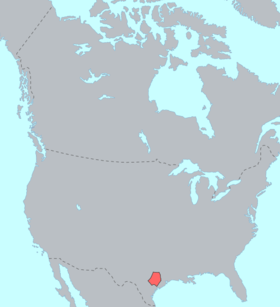Idioma tónkawa
El idioma tónkawa se hablaba en Oklahoma, Texas y Nuevo México por los miembros del pueblo tónkawa. El tónkawa es un idioma extinto, y los miembros de la tribu tónkawa ahora hablan sólo inglés.
| Tónkawa | ||
|---|---|---|
| Hablado en |
| |
| Región | Texas | |
| Familia | Lengua aislada | |
 Área del idioma tonkinawa.
| ||
Descripción lingüística editar
Fonología y escritura editar
| Alfabeto | Pronunciación | Alfabeto | Pronunciación |
| c | /ʦ/ | a | /a/ |
| h | /h/ | a• | /aː/ |
| k | /k/ | e | /e/ |
| kʷ | /kʷ/ | e• | /eː/ |
| l | /l/ | i | /i/ |
| m | /m/ | i• | /iː/ |
| n | /n/ | o | /o/ |
| p | /p/ | o• | /oː/ |
| s | /s/ | u | /u/ |
| t | /t/ | u• | /uː/ |
| w | /w/ | ||
| x | /x/ | ||
| xʷ | /xʷ/ | ||
| y | /j/ | ||
| ' or ? | /ʔ/ |
Vocales editar
El tónkawa tiene 10 vocales:
| Vocal anterior | Vocal posterior | |||||
|---|---|---|---|---|---|---|
| Vocal corta | Vocal larga | Vocal corta | Vocal larga | Vocal corta | Vocal larga | |
| Vocal cerrada | i | iː | u | uː | ||
| Vocal media | e | eː | o | oː | ||
| Vocal abierta | a | aː | ||||
- Las vocales se producen en cinco pares que poseen distinta cantidad vocálica (esto es, vocales cortas vs. vocales largas).
- En los pares de vocales posteriores y medias anteriores, los vocales cortas son fonéticamente más bajas que sus contrapartes cerradas: (/ i / → vocal precerrada [ɪ]), (/ e / → vocal semiabierta [ɛ]), (/ o / → vocal semiabierta [ɔ]).
- Las vocales abiertas (/ a, a ː /) varían entre las articulaciones central y posterior: [a~ɑ, aː~ɑː].
Morfología editar
| Infinitivo | Presente simple (sujeto) |
Presente progresivo (sujeto) |
Presente simple (objeto) |
Presente progresivo (objeto) |
|---|---|---|---|---|
| notox (cultivar) | notxoʔ (él cultiva) | notxonoʔ (él está cultivando) | wentoxoʔ (él los cultiva) | wenotxonoʔ (él los está cultivando) |
| pitsen (cortar) | pitsnoʔ (él corta) | pitsanoʔ (él está cortando) | weptsenoʔ (él los corta) | weptsenanoʔ (él los está cortando) |
| salkox (hacer mala cara) | salkoʔ (él hace mala cara) | salkenoʔ (él está haciendo mala cara) | wesalkoʔ (él hace malas caras) | wesalkenoʔ (él está haciendo mala cara) |
| nepaxkox (fumar) | nepaxkoʔ (él fuma) | nepaxkenoʔ (él está fumando) | wenpaxkoʔ (él los fuma) | wenpaxkenoʔ (él los está fumando) |
| netlox (chupar) | netloʔ (él chupa) | netlenoʔ (él está chupando) | wentaloʔ (él los chupa) | wentalenoʔ (él los está chupando) |
Ejemplo de texto editar
El siguiente texto son las primeras frases de Coyote and Jackrabbit, de Harry Hoijer.
- ha•csokonayla ha•nanoklakno?o xam?al?a•y?ik. ?e•kʷa tanmaslakʷa•low hecne•laklakno?o lak. ha•csokonayla "?o•c!" noklakno?o. "?ekʷanesxaw sa•ken nenxales!" noklakno?o. ?e•ta tanmaslakʷa•lowa•?a•lak hewleklakno?o.
Glosa:
- Coyote / iba a lo largo de, e.d. / en la pradera. Cuando lo hizo así / Liebre / él estaba yaciendo, e.d. / (acusativo). Coyote / "Oho!" / dijo, e.d. "Caballo / mi / lo he encontrado!" / dijo, e.d. Y entonces / esa liebre menc. / él lo atrapó, e.d.
En esta glosa, e.d.es una abreviatura de "está dicho", y menc. de "el mencionado".
Comparación léxica editar
La siguiente tabla muestra los numerales en algunas lenguas indígenas norteamericanas:
GLOSA Atákapa Oc.[1] Atákapa Or.[2] Natchez[3] Chitimacha[4][5] Tónkawa[6] Karankawa[7] '1' tanuʔk hannik wītã (h)unku weˑʔls nā́tsa '2' tsīk hapalšt āwiti (h)upa ketay haíkia '3' lāt nēti kahitie metis kaxáyi '4' himatoʔl tets kinawīti me(če)čant sikit hayo '5' nīt išpīti hussa kaskʷa nā́tsa '6' lāt tsīk lāhanaʔoχ hatẽka haíkia, háyo '7' paχ(e) paighu anʔkwa mīčeta haíkia, nā́tsa '8' himatoʔl tsīk apkatūpiš kweta haíkia '9' wōš išōlan /
tegghuiauwitipkatūpiš kwičeta haíkia '10' wōš /
heissignōkō heihetie hábe
Los términos del karankawa fueron recopilados A. S. Gatschet a partir de lo que recordabanhacia finales de 1880 algunos ancianos entre ellos Alice Oliver, que sólo recordaban palabras y no estaban segurods de los significados de ahí las inconsistencias en la lista.
Referencias editar
- ↑ atákapa Dictionary
- ↑ atákapan Numerals
- ↑ Natchez numerals
- ↑ Chitimacha Words
- ↑ Chitimacha Numerals
- ↑ Hoijer, Harry. 1949. An analytical dictionary of the Tonkawa language. University of California publications in linguistics, 5(1). Berkeley: University of California Press.
- ↑ Swanton, John. 1940. Linguistic material from the tribes of southern Texas and northern Mexico.
Bibliografía editar
- Hoijer, Harry. (1933). Tonkawa: An Indian language of Texas. New York: Columbia University. (Extract from Handbook of American Indian languages, Vol. 3).
- Hoijer, Harry. (1946). Tonkawa. in Harry Hoijer et al., Linguistic Structures of Native America, 289-311.
- Hoijer, Harry. (1949). An Analytical Dictionary of the Tonkawa Language. Berkeley, CA: University of California Publications in Linguistics 5.
- Hoijer, Harry. (1972). Tonkawa Texts. Berkeley, CA: University of California Publications in Linguistics 73.
- Mithun, Marianne. The Languages of Native North America. Cambridge: Cambridge University Press, 1999.
- "The Tonkawa Language: Pronunciation Key." Internet: <https://web.archive.org/web/20050316021951/http://www.tonkawatribe.com/culture/language.htm> October 12, 2005.